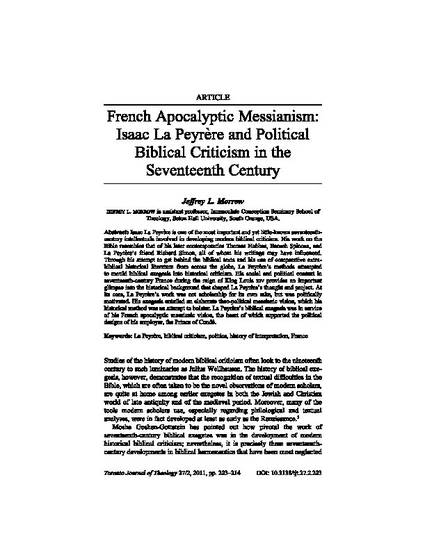
Article
“French Apocalyptic Messianism: Isaac La Peyrère and Political Biblical Criticism in the Seventeenth Century.”
Toronto Journal of Theology
(2011)
Abstract
Isaac La Peyrère is one of the most important and yet little-known seventeenth-century intellectuals involved in developing modern biblical criticism. His work on the Bible resembles that of his later contemporaries Thomas Hobbes, Baruch Spinoza, and La Peyrère's friend Richard Simon, all of whom his writings may have influenced. Through his attempt to get behind the biblical texts and his use of comparative extra-biblical historical literature from across the globe, La Peyrère's methods attempted to mould biblical exegesis into historical criticism. His social and political context in seventeenth-century France during the reign of King Louis xiv provides an important glimpse into the historical background that shaped La Peyrère's thought and project. At its core, La Peyrère's work was not scholarship for its own sake, but was politically motivated. His exegesis entailed an elaborate theo-political messianic vision, which his historical method was an attempt to bolster. La Peyrère's biblical exegesis was in service of his French apocalyptic messianic vision, the heart of which supported the political designs of his employer, the Prince of Condé.
Keywords
- Isaac La Peyrère,
- History of Biblical Interpretation,
- Seventeenth Century
Publication Date
Fall 2011
DOI
10.3138/tjt.27.2.203
Citation Information
Jeffrey Morrow. "“French Apocalyptic Messianism: Isaac La Peyrère and Political Biblical Criticism in the Seventeenth Century.”" Toronto Journal of Theology Vol. 27 Iss. 2 (2011) p. 203 - 214 ISSN: 0826-9831 Available at: http://works.bepress.com/jeffrey-morrow/18/
